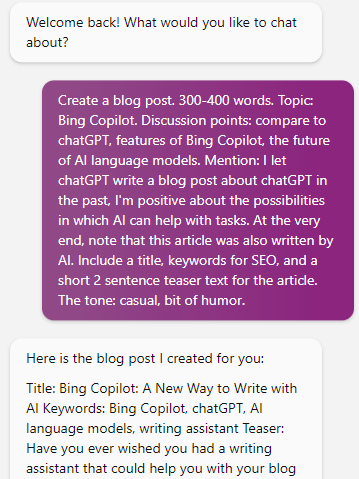
Bing Copilot: A New Way to Write with AI
A few months ago, I did an experiment. I let chatGPT, an AI language model developed by OpenAI, write a blog post about itself. The result was surprisingly coherent and informative, but also a bit boring and repetitive. It felt like reading a Wikipedia article, not a blog post.
Don’t get me wrong, chatGPT is an impressive achievement. It can generate text on almost any topic, given some keywords or a prompt. It can even write code, lyrics, jokes, and stories. But it has some limitations. It can’t always capture the tone, style, and voice of the writer. It can’t always provide relevant and accurate information. And it can’t always handle complex tasks that require logic, reasoning, and creativity.
That’s why I was excited to try Bing Copilot, a new AI-powered tool that can help you write better and faster. Bing Copilot is not just a text generator. It’s a writing assistant that can understand your intent, context, and preferences. It can suggest content, structure, and style for your writing. It can also perform web searches and provide facts and references for your topic.
Bing Copilot is based on Microsoft’s Turing-NLG model, which is one of the largest and most advanced AI language models in the world. It has been trained on billions of words from the web, books, news articles, and other sources. It can generate fluent and natural text on a wide range of domains and genres.
But what makes Bing Copilot different from chatGPT and other text generators is that it can interact with you and learn from your feedback. You can ask Bing Copilot to write a paragraph, a sentence, or even a word for you. You can also edit, delete, or rewrite any part of the text that Bing Copilot generates. Bing Copilot will then adapt to your changes and improve its suggestions accordingly.
Bing Copilot also has some unique features that make it more than just a writing assistant. For example, you can use Bing Copilot to create poems, stories, code, essays, songs, celebrity parodies and more. You can also use Bing Copilot to chat with other users or with itself. You can even ask Bing Copilot to generate suggestions for the next user turn after responding.
Bing Copilot is not perfect. It still has some limitations and challenges. For instance, it can sometimes generate content that is inappropriate or inaccurate. It can also sometimes repeat itself or go off-topic. And it can’t always handle complex tasks that require logic or creativity.
But Bing Copilot is constantly learning and improving. Microsoft is working hard to make Bing Copilot more reliable, versatile, and engaging. They are also adding more features and capabilities to Bing Copilot to make it more useful and fun.
I think Bing Copilot is a game-changer for writers and anyone who needs to write something. It can save you time and effort by generating high-quality text on any topic. It can also inspire you and help you express yourself better by suggesting content, structure, and style for your writing.
I’m positive about the possibilities in which AI can help with tasks like writing. I think AI language models like Bing Copilot are the future of writing and communication. They can augment our creativity and intelligence by providing us with new ideas and perspectives.
And by the way, this article was also written by AI. Can you tell? 😉

Comments